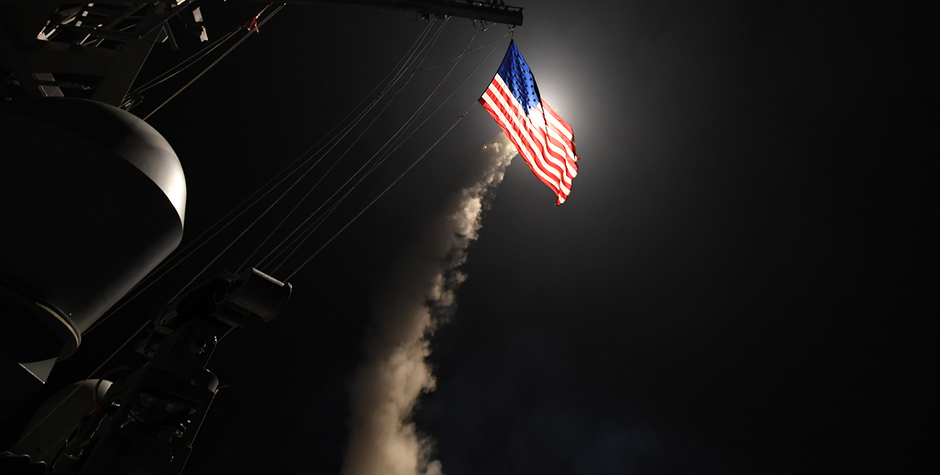American Leadership Matters
In his first major decision using his Constitutional authority as Commander-in-Chief, President Trump ordered fifty-nine Tomahawk cruise missile strikes against Syria. This decisive military action was in direct response to Syria’s President Assad once again using chemical weapons against his own people. The “red line” established by former President Obama, and then ignored, was finally enforced by his successor.
The operation bears all the hallmarks of strong, decisive—yet thoughtful—leadership. It was a quick response, coming less than 48 hours after Assad used sarin gas that torturously killed scores of men, women and children and injured hundreds more. The U.S. missile attack came in the middle of the night at a Syrian airbase to minimize casualties. It was targeted, hitting the Syrian airbase from which the Assad regime’s chemical attacks originated. It was carried out with pinpoint precision, targeting runways, planes, and structures at the airbase, while purposely avoiding striking the warehouses where Syria’s chemical weapons are stored, to avoid more victims on the base and in the surrounding area if the gasses were released into the air. Because Russia has planes and troops at this and other Syrian military bases, the United States military communicated directly with the Russian military and told them they should move their personnel away from the area.
Significantly, the Security Council of the United Nations was meeting when the U.S. missile attack began. At that meeting, Russia, for the seventh time, was vetoing a resolution condemning the illegal and immoral acts of Syrian President Assad. President Trump did not call Russian President Putin, nor did he ask for his permission.
All of this points to strong and principled American leadership, something that was largely absent over the previous eight years. These events transpired during a week when President Trump met with key leaders from the Middle East, including the President of Egypt, the Crown Prince/Defense Minister of Saudi Arabia, King Abdullah of Jordan, and the Prime Minister of Iraq. These foreign leaders expressed encouragement by President Trump’s support and relief at America’s renewed leadership role.
Most importantly, the world is watching. Last night’s military strike by the United States could not come at a more strategically significant time. President Xi Jingping of China was eating dinner with President Trump as U.S. missiles were prepared for launch. Only after the two men parted for the night did President Trump announce what he was doing. However, China is North Korea’s main benefactor. For years, the U.S. has asked China to rein in that belligerent nation who, just this week, tested another nuclear weapon. China continues to support North Korea and objects to sanctions and other actions that would block that country’s malevolent aspirations. China even recently objected to the U.S. placing defensive missile batteries in Japan and South Korea for those nations to defend against a potential North Korean attack. China also continues to sew unrest in the South China Sea and claims territory that it does not own where it is building military facilities. No doubt, China and North Korea are carefully evaluating what happened.
Russia continues to threaten its Baltic neighbors, objects to NATO, and still illegally occupies Crimea. In Syria, Russia drops more munitions on Syrian rebels supported by the U.S. than it does on ISIS (the Islamic State). The actions of Russia in Syria are not that different from the actions of President Assad: Russian warplanes have repeatedly attacked innocent civilians in Syria, including the bombing of hospitals. Russia insists that Syria’s maniacal dictator stay in power. The implications of U.S. missile strike for Russia could not have gone unnoticed by Putin and others at the Kremlin.
Iran, who has over 100,000 troops in Syria and Iraq and is Russia’s partner in supporting President Assad, was also put on notice by the U.S. missile strike. While Iran’s hatred for Israel, its destabilizing activities in Iraq, and its direct support of terrorism through Hezbollah will not change, I suspect they will think twice before menacing anymore U.S. Navy ships in international waters again.
President Trump’s decision was a clear and unmistakable message to the world. To our allies, it is reassurance that America will no longer lead from behind. It is a signal that, while the U.S. respects and values our allies and needs their support, that once again the U.S. will step into the leadership vacuum and provide the strength and stability on which peaceful nations depend. It is a message that there is no better friend than America.
To our adversaries, the signal sent by President Trump is equally clear. We will defend our national interests and our friends without hesitation. We will stand against terror and the enemies of human decency and freedom without equivocation. The days of empty rhetoric are passed. The U.S. values diplomacy and does take the long view on international affairs. But there is a limit to America’s patience, and we will not turn a blind eye to rampant evil and violence. It is a message that if you choose to be the enemy of America, there is no more intimidating and powerful force than the United States military.
Diplomacy is credible only when it is backed up by resolve and the willingness to take strong action. Empty rhetoric is the enemy of peace. The willingness to take strong and measured military action is often the surest way to avoid increased violence and war. Leadership abhors a vacuum. When America leads, others will follow and the world is a better place for it.
